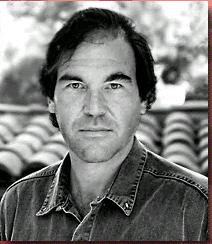|
|
|
 Occupation: Director
Occupation: Director  Awards
AwardsSince the mid-1970s, Stone has evolved from a respected screenwriter of major features and director of modest genre fare to become one of the most honored, best known, and controversial filmmakers working in modern Hollywood. Impressively, Stone has made his name and fortune from "difficult" political subjects—the Vietnam War, the Kennedy assassination, US involvement in El Salvador—which, in other hands, generally fail to ignite the box office. Stone is also a successful producer, overseeing such diverse projects as Barbet Schroeder's REVERSAL OF FORTUNE, Kathryn Bigelow's BLUE STEEL (both 1990), and Wayne Wang's THE JOY LUCK CLUB (1993). He also executive produced "Wild Palms" (ABC, 1993), a popular paranoid sci-fi miniseries.
Stone first gained acclaim as a writer, winning an Oscar, a Writers Guild Award and a Golden Globe for his screenplay for MIDNIGHT EXPRESS (1978). Prior to that, at age 25, he wrote, directed, and edited SEIZURE (1974), a stylish, low-budget ($150,000) Canadian horror film starring Jonathan Frid (of "Dark Shadows" fame). An intriguing cast failed to compensate for the incoherence of the screenplay about a novelist, his family, and friends, who are bedeviled by what may be the writer's nightmares given flesh; the film has nonetheless acquired a small cult following. Stone returned to horror for his next directing assignment THE HAND (1981), a retread of THE BEAST WITH FIVE FINGERS (1946), starring Michael Caine as a cartoonist who loses his hand in an accident. His life becomes further complicated when his missing member goes on a murder spree. Stone's screenwriting jobs were somewhat more respectable genre films, including CONAN THE BARBARIAN (1982), co-written with director John Milius; Brian De Palma's SCARFACE (1983); and YEAR OF THE DRAGON (1985), co-written with director Michael Cimino. While these films have their admirers, each to varying degrees reflects criticisms that would plague much of Stone's work as a director charges of racism (particularly towards Asians), excessive violence, and the marginalization of female characters.
With the release of SALVADOR (1986), Stone was off and running to achieve his current status as one of Hollywood's most forceful directors, tackling social and political themes with evident skill and commitment, as well as generous doses of bombast. His films were often heavy-handed, a bit simplistic, and masculinist but they moved people with their big emotions and powerhouse imagery. Stone received a second Oscar and a Directors Guild Award for PLATOON (1986), one of the starkest treatments of the Vietnam war to reach American screens, and brought a similarly uncompromising gaze to bear on the world of high finance in WALL STREET (1987), the street where his own father plied his trade as a stockbroker. BORN ON THE FOURTH OF JULY (1989), meanwhile, based on the true story of Vietnam veteran Ron Kovic and featuring Tom Cruise in his first "heavyweight" dramatic role, earned Stone a second DGA Award and Oscar for directorial achievement. The film depicted Kovic's evolution from naive gung-ho kid to frightened soldier to embittered paraplegic to committed anti-war activist.
Stone's most ambitious and controversial work was JFK (1991), a dramatization of the attempts by New Orleans D.A. Jim Garrison (Kevin Costner) to uncover a conspiracy behind the assassination of President John F. Kennedy. A substantial artistic achievement which weaves volumes of theories and hypotheses into a narrative peppered with colorful cameo performances, the film led to Congress's opening of the classified files relating to the shooting, as well as providing armies of conspiracy theorists with ammunition for their views. Stone reached a new level of notoriety with the release of JFK; no longer just a filmmaker, he was a political figure. As such, Stone was variously attacked and applauded by politicians, editorial writers and newspaper columnists across the country.
Stone returned to Vietnam for HEAVEN & EARTH (1993) but this story was told from an Asian female perspective. Based on two autobiographical books by Le Ly Hayslip, When Heaven and Earth Changed Places and Child of War, Woman of Peace, this was the continent-spanning story of how the war impacted upon the life of one young woman in Vietnam and back in the States with her American husband. Some saw the film as an atonement for the narrow "American male" point of view expressed in the first two installments of Stone's unplanned Vietnam trilogy. In any event, the film was greeted by mixed reviews and lukewarm box office.
Stone actively courted controversy again with NATURAL BORN KILLERS (1994), a project that harkened back to his early pulp fictions. The original story by hotshot writer-director Quentin Tarantino was overwhelmed by Stone's hallucinogenic vision of two lovers (Woody Harrelson and Juliette Lewis) who become media darlings due to a spectacular murder spree. Taking inspiration from music videos, commercials, and other media, NATURAL BORN KILLERS launched a sensory assault with an ultra-cool soundtrack, rapid-fire montages, various film stocks, animated sequences, and sharply observed TV parodies. Audiences and reviewers alike were sharply divided over the film's merits but it opened to brisk box office.
Stone returned to politics and history with his massive, controversial, near Shakespearean study of the 37th President of the United States, NIXON (1995). Clocking in at over three hours, filled with visual gimmicks (flashbacks, black and white footage, varying film stock) and layered in pop psychology, NIXON (played by Anthony Hopkins) attempts to capture the essence of the man, but fails to truly humanize him. Nonetheless, there were critics who hailed NIXON as a masterpiece and most reviewers agreed that Stone elicited strong performances from the ensemble (including Joan Allen as Pat Nixon, James Woods as H.R. Haldeman, and E.G. Marshall as John Mitchell).
© 2000 Cinemania Corporation and/or its suppliers. All rights reserved.